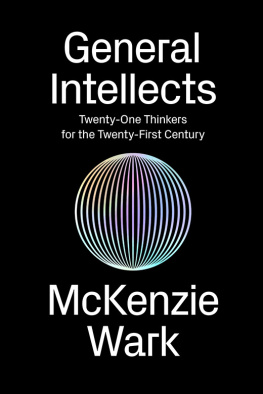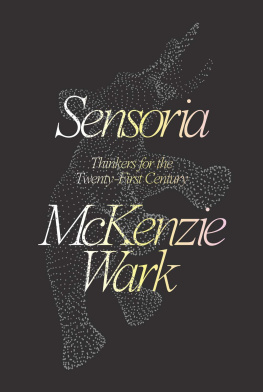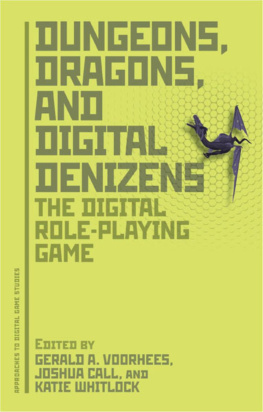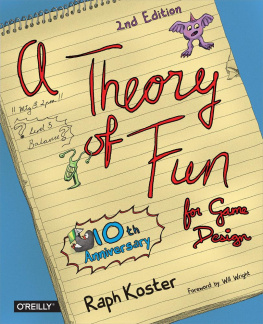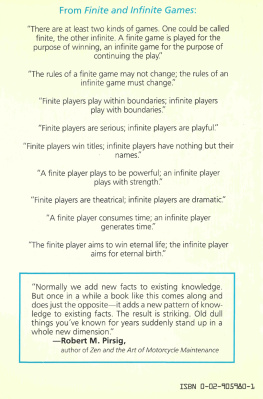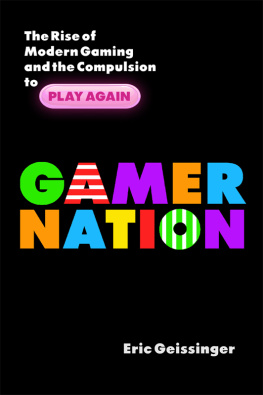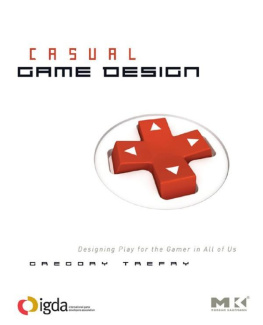Gamer
Theory
Gamer
Theory
McKENZIE WARK
HARVARD UNIVERSITY PRESS
Cambridge, Massachusetts, and London, England
2007
Copyright 2007 by McKenzie Wark
All rights reserved
Printed in the United States of America
Many of the designations used by manufacturers and sellers to distinguish their products are claimed as trademarks. Where those designations appear in this book and Harvard University Press was aware of a trademark claim, the designations have been presented with the capitalization that appears on the manufacturers official website (PlayStation, Dungeons & Dragons, SimEarth, PowerPoint, etc.).
Cataloging-in-Publication Data available from the Library of Congress
Library of Congress catalog card number: 2006102852
ISBN-13: 978-0-674-02519-6 (alk. paper)
ISBN-10: 0-674-02519-9 (alk. paper)
For Felix
(and his playmates)
Lude Feliciter
Acknowledgments
First, I must thank all of the participants in GAM3R 7H30RY, a networked book which presented version 1.1 of this text as a pretext for comments and discussion. For version 2.0, I made many changes to the text on the basis of the comments offered there by gamers, theoryheads, media hackers, and other organic intellectuals of the digital age. An edited selection of the comments pertaining directly to the text are included among the notes (Cuts) at the end.
I would also like to thank The Institute for the Future of the Book for hosting GAM3R 7H30RY version 1.1 and for many stimulating discussions. It would not have been half as much fun without Bob Stein, Ben Vershbow, Ray Cha, Dan Visel, and Jesse Wilbur.
I am grateful to my students at Eugene Lang College. Computer games are a key part of the shared culture from which one can begin the processas laborious as it is playfulof creating a reflective and critical approach to the times. My students at Lang have been active participants in the shaping of the ideas in this book.
Finally, thanks to the terrific team at Harvard University Press, including Lindsay Waters, Phoebe Kosman, Susan Wallace Boehmer, Tim Jones, and Andrew Battle, for the skill and care with which this book has been brought into the world.
Any remaining acts of folly are to be charged directly to my own account.
CONTENTS
The unreality of games gives notice that reality is not yet real. Unconsciously they rehearse the right life.
T HEODOR A DORNO
There is an absolute in the moment of the game; and this absolute, like every reality or moment taken to the absolute, represents a specific form of alienation.
H ENRI L EFEBVRE
[001]
E VER GET THE FEELING youre playing some vast and useless game whose goal you dont know and whose rules you cant remember? Ever get the fierce desire to quit, to resign, to forfeit, only to discover theres no umpire, no referee, no regulator to whom you can announce your capitulation? Ever get the vague dread that while you have no choice but to play the game, you cant win it, cant know the score, or who keeps it? Ever suspect that you dont even know who your real opponent might be? Ever get mad over the obvious fact that the dice are loaded, the deck stacked, the table rigged and the fixin? Welcome to gamespace. Its everywhere, this atopian arena, this speculation sport. No pain no gain. No guts no glory. Give it your best shot. Theres no second place. Winner take all. Heres a heads up: In gamespace, even if you know the deal, are a player, have got game, you will notice, all the same, that the game has got you. Welcome to the thunderdome. Welcome to the terrordome. Welcome to the greatest game of all. Welcome to the playoffs, the big league, the masters, the only game in town. You are a gamer whether you like it or not, now that we all live in a game-space that is everywhere and nowhere. As Microsoft says: Where do you want to go today? You can go anywhere you want in gamespace but you can never leave it.
[002]
SUPPOSE there is a business in your neighborhood called The Cave. It offers, for an hourly fee, access to game consoles in a darkened room. Suppose it is part of a chain. The consoles form a local area network, and also link to other such networks elsewhere in the chain. Suppose you are a gamer in The Cave. You test your skills against other gamers. You have played in The Cave since childhood.* Your eyes see only the monitor before you. Your ears hear only through the headphones that encase them. Your hands clutch only the controller with which you blast away at the digital figures who shoot back at you on the screen. Here gamers see the images and hear the sounds and say to each other: Why, these images are just shadows! These sounds are just echoes! The real world is out there somewhere. The existence of another, more real world of which The Cave provides mere copies is assumed, but nobody thinks much of it. Here reigns the wisdom of PlayStation: Live in your world, play in ours.
[003]
PERHAPS you are not just any gamer. Perhaps you want to break with the stereotype.* You are the one who decides to investigate the assumption of a real world beyond the game. You turn away from the screen and unplug the headphones. You get up and stagger out of the darkened room, toward the light outside. You are so dazzled by the light that the people and things out there in the bright world seem less real than the images and sounds of The Cave. You turn away from this blinding new world, which seems, strangely, unreal. You return to the screen and the headphones and the darkness of being a gamer in The Cave.
[004]
SUPPOSE someone, a parent maybe, a teacher or some other guardian, drags you back out into the light and makes you stay there. It would still be blinding.* You could not look directly at things. Maybe the guardian prints out some pics of your family or maybe a map of the neighborhood, to acclimatize you, before you can look at things. Gradually you see the people around you and what it is that they do. Then perhaps you remember the immense, immersive games of The Cave, and what passes for wisdom amongst those still stuck there. And so you return to The Cave, to talk or text to the other gamers about this world outside.
[005]
YOU COMMUNICATE to fellow gamers in The Cave about the outside world of which The Cave is just a shadow. Or try to. Plato: And if the cave-dwellers had established, down there in the cave, certain prizes and distinctions for those who were most keen-sighted in seeing the passing shadows, and who were best able to remember what came before, and after, and simultaneously with what, thus best able to predict future appearances in the shadow-world, will our released prisoner hanker after these prizes or envy this power or honor?* You bet! The Cave is a world of pure agon, of competitive striving after distinction. But suppose you are that rare, stray, thoughtful gamer who decides to try this new game of getting beyond the game one more time? Suppose you emerge from The Cave and decide to take stock of the world beyond? You find that this other world is in some curious ways rather like The Cave. The pics of family, the map of the hood, seem made of the same digital stuff as your favorite games inside The Cave. If there is a difference, it may not be quite what it seems.
[006]
HERE IS what you observe about the world outside The Cave: The whole of life appears as a vast accumulation of commodities and spectacles, of things wrapped in images and images sold as things.* But how are these images and things organized, and what role do they call for anyone and everyone to adopt toward them? Images appeal as prizes, and call us to play the game in which they are all that is at stake. You observe that world after world, cave after cave, what prevails is the same agon, the same digital logic of one versus the other, ending in victory or defeat. Agony rules! Everything has value only when ranked against something else; everyone has value only when ranked against someone else. Every situation is win-lose, unless it is win-wina situation where players are free to collaborate only because they seek prizes in different games. The real world appears as a video arcadia divided into many and varied games. Work is a rat race. Politics is a horse race. The economy is a casino. Even the utopian justice to come in the afterlife is foreclosed:
Next page

